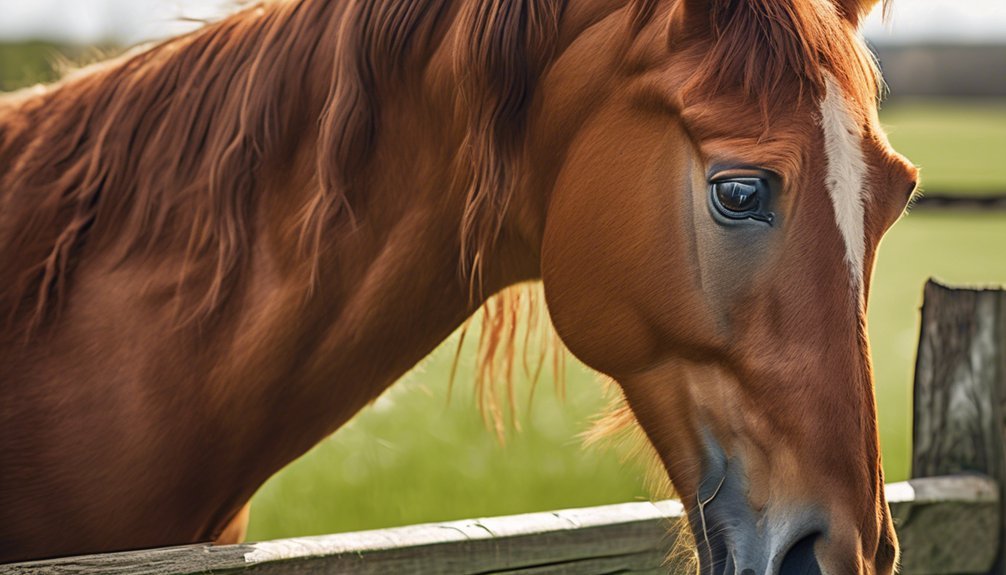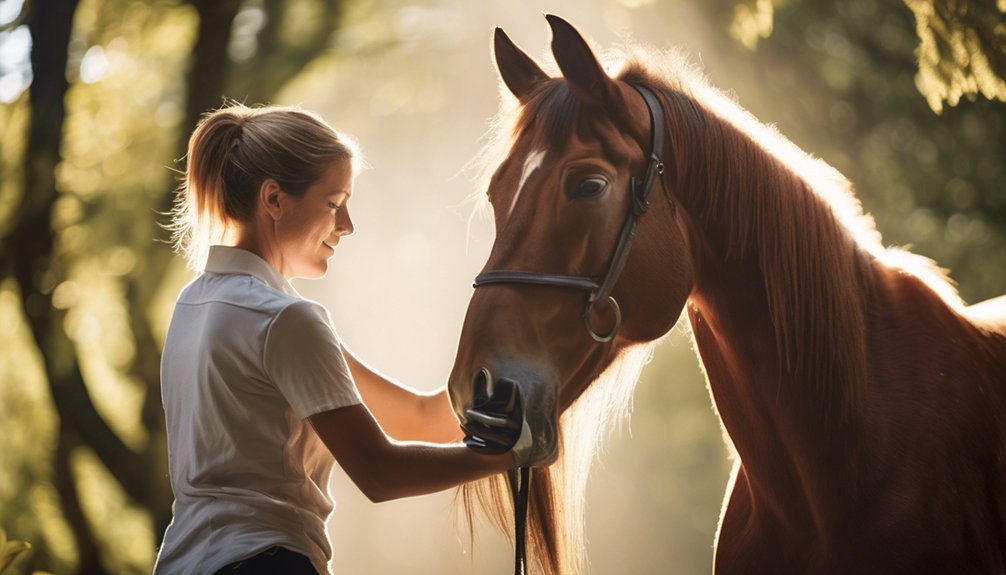
If your horse is constantly scratching and showing signs of discomfort, addressing the issue promptly is crucial. Itching can stem from various causes, including allergies and skin infections. Identifying the symptoms and understanding the underlying factors is essential for effective treatment. In the following sections, you'll discover proven approaches and remedies that can help alleviate your horse's itching and enhance their overall skin health.
Key Takeaways
- Identify the underlying cause of itching through thorough examination for signs of skin infections, allergies, or irritations.
- Utilize topical treatments like medicated shampoos and soothing creams for immediate relief.
- Implement dietary changes by adding omega fatty acids to promote skin health and reduce itching.
- Maintain a clean environment to minimize allergens and prevent skin irritations.
- Consider natural remedies, such as herbal rinses and soothing oils, while patch testing for adverse reactions.
Common Causes of Itching in Horses

When you notice your horse scratching or rubbing against objects, it's crucial to identify the underlying causes of itching. One common cause could be allergic reactions, which may stem from environmental factors like pollen, dust, or certain feed ingredients. These allergies can lead to significant discomfort, prompting your horse to seek relief through scratching.
Additionally, skin infections, whether bacterial or fungal, can also trigger intense itching. These infections often arise from wounds or irritations that become inflamed. It's essential to examine your horse's skin closely for any signs of redness, swelling, or discharge.
Identifying Symptoms of Itching
You might notice various symptoms when your horse is experiencing itching. Look for excessive rubbing against stalls, fences, or trees, as this can indicate discomfort.
You may also observe hair loss, particularly in patches, and areas of redness or inflammation on the skin. Check for flaky skin or scabs, which are common signs of skin allergies or irritation.
If your horse frequently stamps its feet or exhibits restless behavior, parasite infestations might be the culprit. Additionally, persistent scratching can lead to secondary infections, further complicating the issue.
Effective Treatments for Itching

Tackling itching in horses requires a multifaceted approach to ensure relief and prevent recurrence.
Start with topical treatments, such as medicated shampoos or soothing creams, designed to alleviate irritation. These products can help soothe the skin and reduce inflammation.
Additionally, consider making dietary adjustments. A balanced diet rich in omega fatty acids can enhance skin health and reduce sensitivity. Consult your veterinarian about supplements that support skin integrity and immune function.
Keep your horse's environment clean and free from allergens to further minimize itching triggers. Regular grooming can also help by removing dirt and debris, allowing for better absorption of treatments.
Natural Remedies for Itchy Horses
While conventional treatments can provide relief, many horse owners seek natural remedies to address itching. Herbal solutions can be effective; consider using calendula or chamomile for their anti-inflammatory properties. You can make a soothing herbal rinse by steeping these herbs in hot water, then applying the cooled infusion to your horse's skin.
Additionally, soothing oils like coconut or neem oil can help moisturize and protect the skin. These oils not only relieve itching but also create a barrier against irritants.
Mix a few drops of lavender oil for its calming effects and pleasant scent. Always patch test any remedy to ensure your horse doesn't have an adverse reaction.
Importance of Regular Grooming

Regular grooming plays a vital role in maintaining your horse's overall health and comfort.
By incorporating effective grooming techniques into your routine, you can enhance your horse's skin health and reduce discomfort.
Here are three key benefits of regular grooming:
- Improved Circulation: Grooming stimulates blood flow, promoting healthy skin and coat.
- Early Detection: Regular checks allow you to spot skin irritations, parasites, or injuries before they escalate.
- Bonding: This intimate practice strengthens your relationship, fostering trust and cooperation between you and your horse.
Preventative Measures to Reduce Itching
To effectively prevent itching in horses, implementing a proactive approach is essential.
Start by making dietary adjustments; incorporating omega-3 fatty acids can improve skin health and reduce inflammation. Ensure your horse receives high-quality forage and supplements tailored to its specific needs.
Next, focus on environmental management. Keep your horse's living area clean and dry to minimize exposure to irritants like dust, mold, and parasites.
Regularly rotate pastures to prevent overgrazing and limit contact with potential allergens.
Consider using fly sheets and insect repellents during peak seasons to shield your horse from bites.
When to Consult a Veterinarian

When should you consult a veterinarian about your horse's itching? If your horse's discomfort persists or worsens, it's crucial to seek veterinary advice.
Here are three key indicators that warrant a professional evaluation:
- Severe Scratching: If your horse is excessively scratching, leading to skin damage, this could indicate an underlying issue requiring an itching diagnosis.
- Swelling or Inflammation: Notice any swelling, redness, or inflammation in affected areas? These signs can signal infections or allergic reactions.
- Behavioral Changes: If your horse becomes unusually irritable or anxious due to itching, it's time to get expert help.
Addressing these symptoms quickly can prevent more serious complications and improve your horse's quality of life.
Don't hesitate—your horse deserves the best care.
Frequently Asked Questions
Can Diet Influence Itching in Horses?
Yes, your horse's diet can definitely influence itching. Dietary changes may help alleviate skin issues, especially if nutritional deficiencies exist. Ensuring a balanced diet rich in essential nutrients can promote overall skin health and comfort.
Are Certain Breeds More Prone to Itching?
Did you know that certain breeds, like Thoroughbreds and Arabians, often show a higher breed predisposition to skin issues? If you own one of these itchy breeds, it's crucial to monitor their skin health closely.
How Can Weather Affect My Horse's Itching?
Weather significantly impacts your horse's itching. High humidity levels can exacerbate skin conditions, while seasonal changes may trigger allergies. Monitoring these factors helps you manage your horse's comfort and overall skin health effectively.
Is Itching Contagious Between Horses?
Itching's like a whisper between horses; it can spread through direct contact or contaminated grooming tools. While itch transmission isn't common, maintaining diligent horse care practices helps prevent potential outbreaks and keeps your equine friends comfortable.
Can Stress Contribute to a Horse's Itching?
Yes, stress factors can definitely contribute to a horse's itching. When your horse experiences anxiety symptoms, it may lead to increased scratching or skin irritation, exacerbating any underlying conditions. Observing their behavior is crucial.
Conclusion
In conclusion, tackling itching in horses is crucial for their comfort and well-being. By identifying the root cause and employing effective treatments, you can transform your horse from a scratching machine into a picture of serenity. Regular grooming and preventative measures are your best allies in this battle against discomfort. Don't underestimate the power of a clean environment and proper care—your horse deserves nothing less than a life free from the torment of itching!





